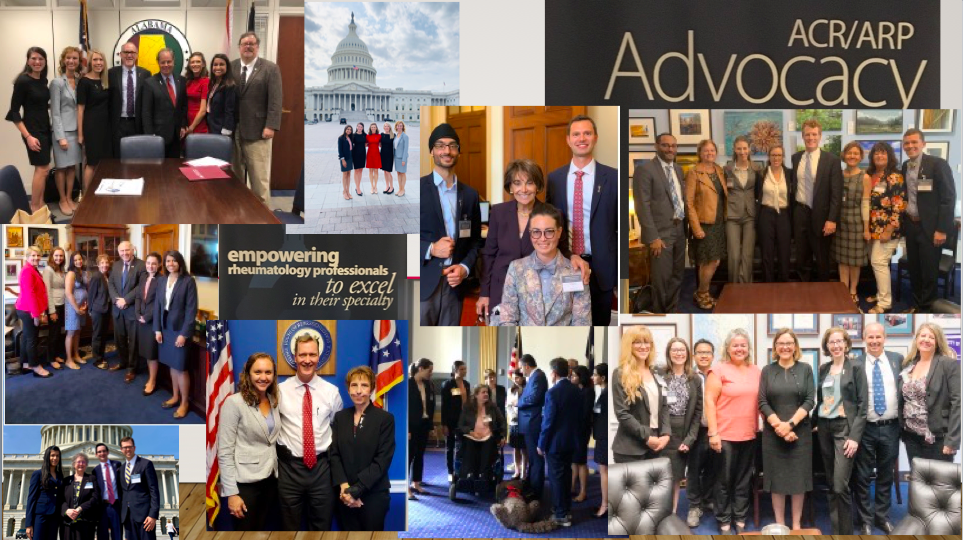Editor’s note: Read a first-person account of the event from Angus Worthing, MD, FACR, FACP, below.
On Sept. 9 and 10, 2019, 112 rheumatology advocates visited 117 of the nation’s top lawmakers and their staffs on Capitol Hill during the ACR’s annual Advocates for Arthritis event, bringing rheumatology professionals and patients together to make their voices heard in the halls of Congress. The meetings this year focused on workforce shortages in rheumatology and on limiting the effects of step therapy, whereby insurers may not approve a doctor-prescribed therapy until the patient has tried a drug preferred by the insurance company, even if the doctor believes the insurer-preferred treatment will not be effective for the patient.
Twenty-two rheumatology fellows also took part in the ACR’s Advocacy 101 program. The course is designed to educate trainees about legislative and regulatory healthcare policies impacting rheumatology and about the challenges of the changing healthcare system that they will face in their careers and practices. The program also engages fellows in health policy and advocacy endeavors.
“I think the issues struck a chord for all of our advocates,” says Angus Worthing, MD, FACR, FACP, a D.C.-based rheumatologist and chair of the ACR’s Government Affairs Committee (GAC). “We are essentially trying to reduce wait times for people to get into a doctor’s office and to get on the medications they need by bolstering the workforce and working on step therapy.”
Advocates also pressed legislators on drug costs. Dr. Worthing says, “Congress and the Trump administration are facing well-deserved pressure from the American public to reduce drug prices and the cost to patients, so the timing was great for us to tell them what the rheumatology community cares about.”
“Meeting with representatives is a great way to exercise our First Amendment rights and feel like we are doing something,” says Ethan Craig, MD, MHS, a rheumatologist at Penn Medicine and GAC member.
Congressional Education
Laura Ballenger, MD, a third-year pediatric rheumatology fellow at Nationwide Children’s Hospital in Columbus, Ohio, returned to Advocates for Arthritis after taking part in Advocacy 101 last year.
“The biggest thing that brought me back is advocacy is really based on educating people and that’s one part of the medical world I really enjoy,” Dr. Ballenger says. “I met with some people again who I met with last year, and it’s exciting to continue the conversation.”
Among the discussions, she says, was a bill introduced this year in the House, the Safe Step Act (H.R.2279), which if passed would provide step therapy exemptions for qualifying patients.
“We are trying to put guardrails on step therapy so there are ways to get our patients the medications they need without have to fail multiple medications first,” Dr. Craig explains.
Boosting the Workforce
Advocates also discussed the factors that underlie workforce shortages in both pediatric and adult rheumatology. A recent analysis projected a deficit of more than 4,000 rheumatologists by 2030 in the U.S.1
For adult rheumatology, there are simply not enough slots to accommodate the number of interested trainees, Dr. Craig explained. On the pediatric side, about half of the available training slots go unfilled each year because of financial disincentives that keep providers from entering the field.
“We have nine states with zero pediatric rheumatologists and five states with just one; there are wide geographic areas lacking pediatric rheumatologists,” Dr. Craig says. “Doing general pediatrics sets you up better as far as lifetime earnings compared with pediatric rheumatologists, despite the extra training.”
Advocates discussed with legislators two current House bills aimed at incentivizing trainees to enter pediatric rheumatology. The EMPOWER Act (H.R.2781) would provide loan forgiveness for pediatric subspecialties in economically underserved areas. The Resident Education Deferred Interest (REDI) Act (H.R.1554) would defer student loan interest while physicians are in residency to reduce the financial barriers to entering subspecialty training.
“I am a pediatric rheumatology fellow, so I feel especially invested in recruiting people into my very small field,” says Dr. Ballenger.
Seeing Results
As a rheumatology health professional, Philadelphia-based Donah Zach Crawford, MA, also feels particularly invested. She is also a rheumatology patient and regular participant in Advocates for Arthritis.
“There have been specific asks through the years, and I really do believe it makes a difference. When we do look back, we’ve had gains over the years,” she says.
“The ACR has really been able to log significant victories despite our small numbers,” says Dr. Worthing. “We led an effort that ultimately resulted in CMS proposing to boost rheumatology reimbursement by 15% instead of reducing it. … Another [win] was preventing MIPS cuts applied to Part B drug costs in clinics.”
Dr. Worthing encourages all rheumatology providers and patients to get involved in advocacy efforts, whether through national events, such as Advocates for Arthritis in D.C., at their local level or “in a minute or two through the ACR website for providers and the Simple Tasks website for patients and families.” The ACR also encourages all rheumatology fellows in the U.S. to participate in Advocacy 101.
“You really do build up a relationship with some of these [government] staffs, and with a lot of them, you feel like they’re on your side,” says Ms. Crawford. “My last words to Rep. Perry [Warren, D-PA] were: ‘Whatever disability costs, it’s more than the medicine. The three of us standing here—me, a teacher, a medical student, who would not be here if we couldn’t get the medications we need in a timely manner—we’re contributing members. We pay a lot in taxes that otherwise would have been spent on us for disability.’ [Rep. Warren] looked at his aide and said: ‘Write that down.’”
Kelly April Tyrrell writes about health, science and health policy. She lives in Madison, Wis.
A Note From Dr. Worthing
Congress is back in session and you know what that means—time for Advocates for Arthritis! At ACR’s annual fly-in advocacy conference, rheumatologists, training fellows, rheumatology professionals and patients converged on Washington, D.C., to learn about advocacy and meet with members of Congress. We held 117 meetings with members and staff to push step therapy reform, boost the rheumatology workforce and discuss ACR’s principles about reducing drug prices—a hot topic of debate right now in D.C.
The Hill was full of energy as advocates were charged up about the issues to reduce patient wait times to see a doctor and get on meds. And with the Twitter hashtag #Act4Arthritis, there was a storm of catchy advocacy haiku tweets—yes, haiku!—that kept it exciting online too (read them all #Act4Arthritis #haiku). One of my favorites was written by Dr. Rebecca Tuetken, who wrote to us from home:
Y’all are gonna be
The rheums that make it happen
#Act4arthritis
Some takeaways from the 2019 Advocates for Arthritis event:
- Our pediatric workforce bill (to repay student loans for needed pediatric specialists, including rheumatologists) was introduced in the Senate by Dr. Bill Cassidy. Thanks to the advocacy of our pediatricians and others, we now have bills in both House and Senate!
- Advocacy 101, the ACR’s conference for fellows-in-training and program directors, grew this year from 16 to 22 attendees. The ACR aspires to continue growing this program so that all U.S. rheumatology fellows will be able to attend at some point during their training. Imagine 10 or 15 years in the future when half our workforce has world-class training in advocating for our profession and our patients!
- ACR President Dr. Paula Marchetta presented Rep. Raul Ruiz (D-CA) with the 2019 ACR Award for Public Leadership in Rheumatology for his outstanding work on step therapy reform and other causes for rheumatology patients. Check out Dr. Ruiz’s tweet about it!
- We anticipate that a Senate companion bill to reform step therapy will be introduced soon.
Couldn’t get to D.C. this year? Spend a few moments at the ACR’s Legislative Action Center to send a pre-written email to Congress. Join the effort from afar and help magnify rheumatology’s message.
— Angus Worthing, MD, FACR, FACP
Reference
- Battafarano DF, Ditmyer M, Bolster MB, et al. 2015 American College of Rheumatology Workforce Study: Supply and demand projections of adult rheumatology workforce (2015–2030). Arthritis Care Res (Hoboken). 2018 Apr;70(4):617–626.



